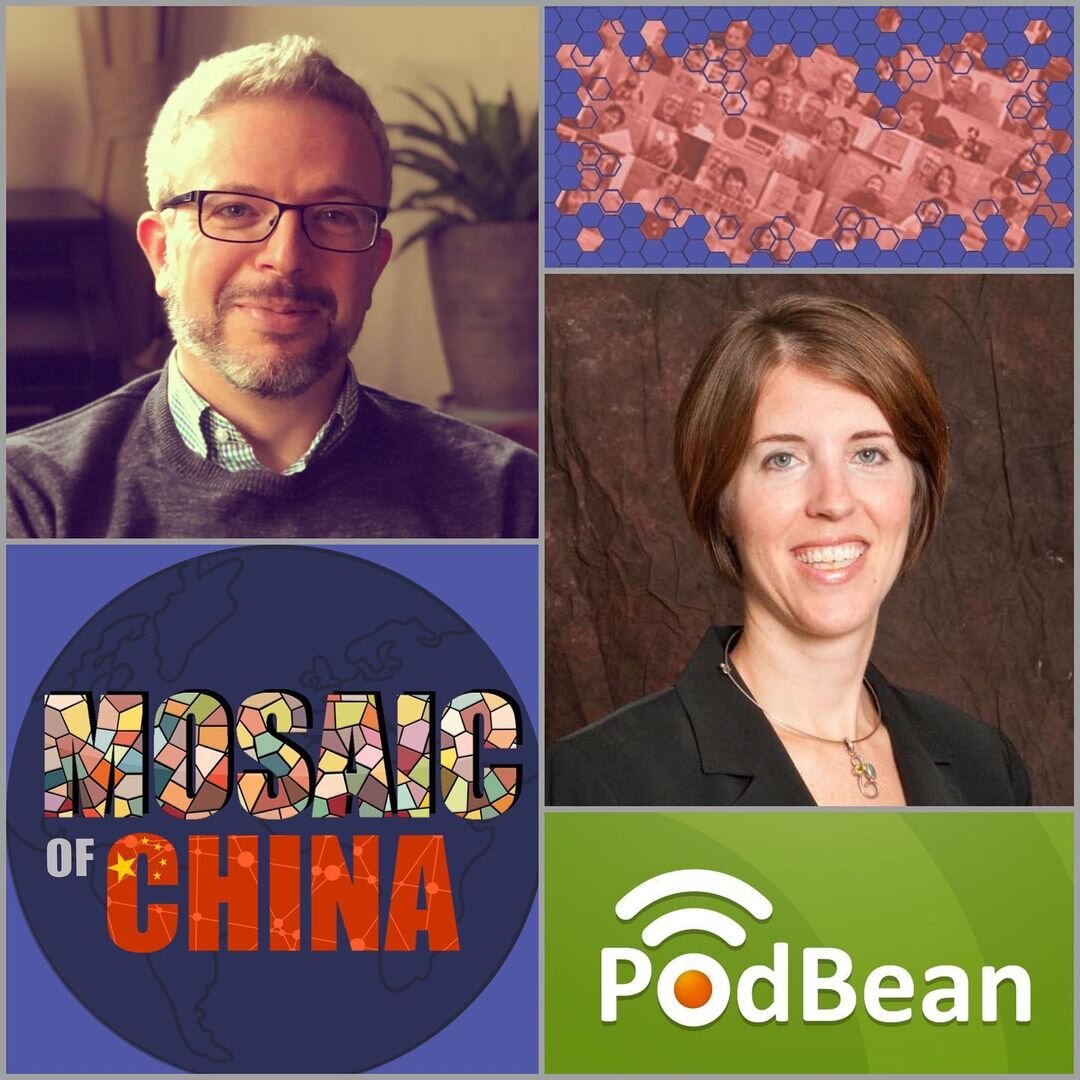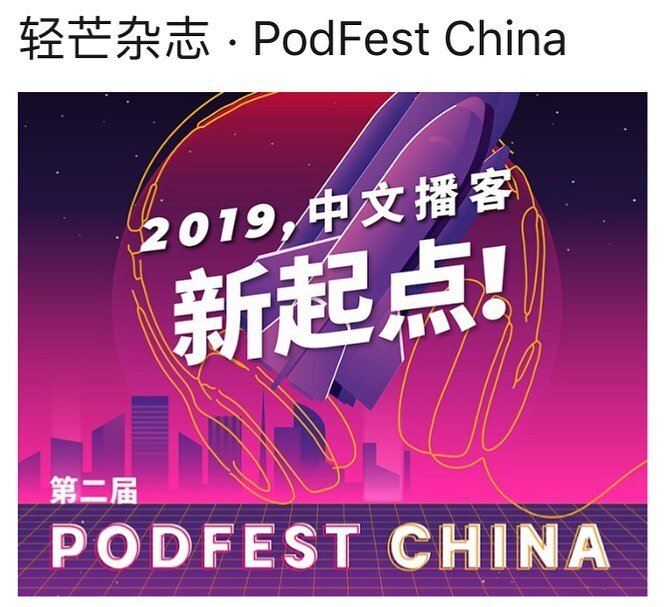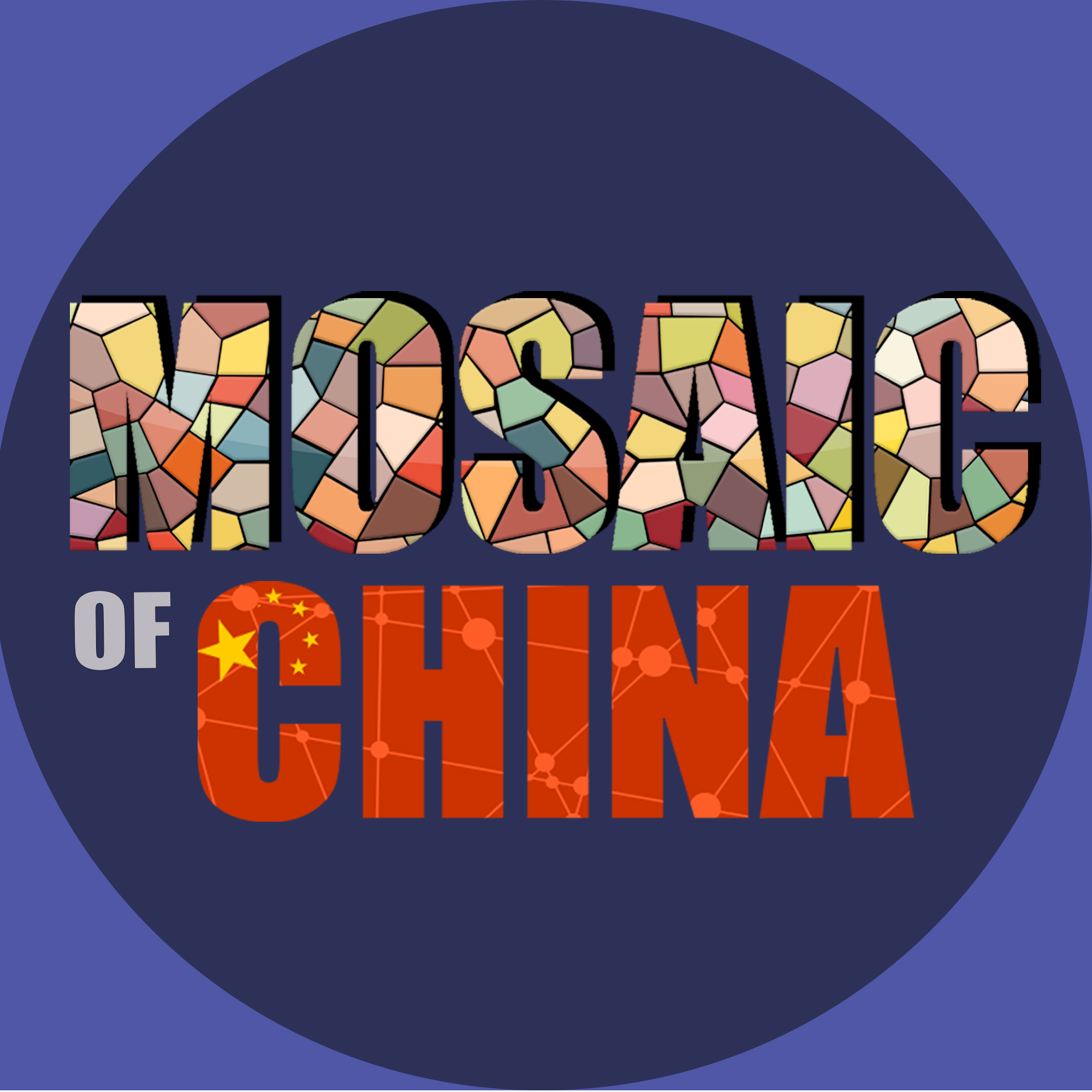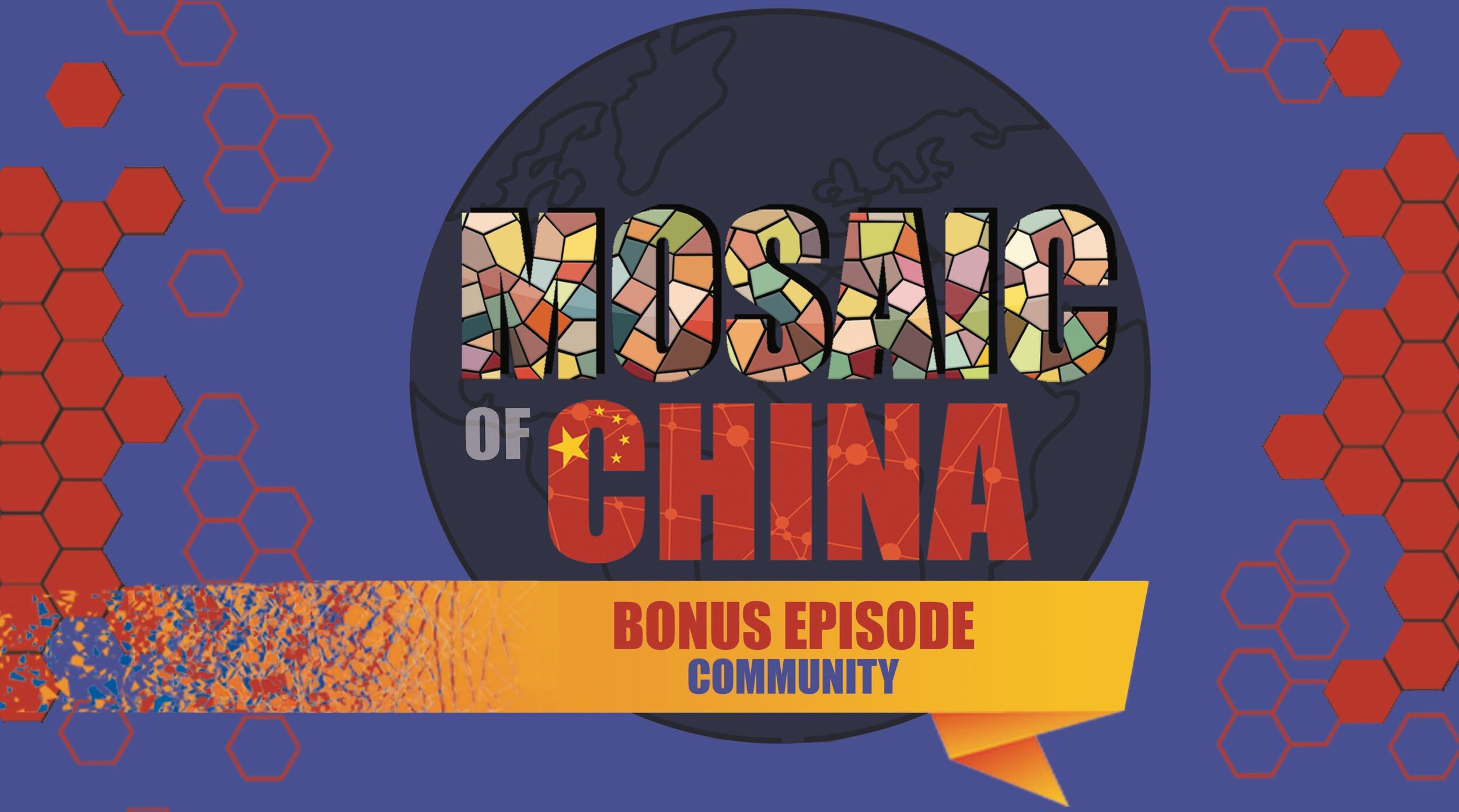Season 01 Bonus: Community
Bonus Episode
Mosaic of China with Oscar Fuchs - “Community”
Original Date of Release: 03 Dec 2019.
We're marking the halfway point of Season 1 by releasing a special episode in which Oscar is interviewy Shannon Martin, Director of Communications at Podbean, to discuss the topic of "Community".
Since building real and virtual communities is at the heart of the Mosaic of China project, this is a conversation that we felt was worth releasing as a bonus episode. Hopefully it will not only interest you, but also encourage you to contribute your thoughts and comments on WeChat, or on whichever platform you prefer.
To Join the Conversation and Follow The Graphics…
View the Facebook Album for this episode. Alternatively, follow Mosaic of China on WeChat.
To view the images below on a mobile device, rotate to landscape orientation to see the full image descriptions.


To Listen Here…
Click the ▷ button below:
To Listen/Subscribe Elsewhere…
1) Click the link to this episode on one of these well-known platforms:
2) Or on one of these China-based platforms:
To Read The Transcript…
[Trailer]
Shannon Martin: I feel like you can start a lot of conversations about culture, about the different topics that your guests bring up, and then maybe someone hasn't even listened yet, but they go “Oh, now I really want to go listen to that episode”. So it can kind of go both ways.
[Intro]
OF: Welcome to Mosaic of China, a podcast about people who are making their mark in China. I'm your host, Oscar Fuchs.
So we're now officially halfway through Season 01. I hope you've enjoyed the first 15 episodes, and we have another 15 great ones on the way. But to mark this milestone, I decided to include a bonus episode this week, which is an interview that I recorded for PodFest China. PodFest China is an event for podcasters and fans - organised by Anita, Yi and Rebecca - which takes place every autumn in Shanghai, in both Mandarin and English. I went to their first one, and it was great. I couldn't make it to the one just now in November. But I was asked to contribute something on the topic of ‘community’, which I jumped at the chance to do, seeing as it's really at the heart of this project. In pretty much every recording in this series, you would have heard me talk about joining the community on WeChat. And this is what we mainly talk about in this interview. But don't worry if you're not on WeChat, we cover many other topics as well.
[Main]
OF: So today is a special episode, because I'm here with Shannon Martin. But I'm not interviewing Shannon, Shannon's going to interview me, which is making me extremely nervous. And you're looking at me with such soft eyes right now. But no, it's not helping.
SM: I'm usually on the other side of things. So I don't know if I feel more or less nervous, actually.
OF: And so just for people who don't know you, what is it that you do here in Shanghai?
SM: Actually I work in podcasting. And I work for a company called PodBean, we’re a podcast hosting platform, the host of your podcast. I'm the Communications Director, so I'm the liaison with the podcasting community, communicating to our podcasters.
OF: And PodBean is an interesting company because a lot of its market is in the West, but its founders were from China.
SM: Yeah, exactly. They were from China, they actually were based in the US, and we have employees remotely all over. Probably over time we'll get on just about every continent, but the biggest majorities of our customers is US-based, because it's the biggest podcasting space. And then we're kind of spread amongst all the different continents.
OF: Well, I've been asking you the questions, I have to shut up now and let you ask me some, don’t I.
SM: OK, I’ll put you in the hot seat. Just to really start at the beginning, what inspired you to start the podcast?
OF: Right, well, I have an official answer and the real answer. So let me give you the official answer first. I've always been a podcast fanatic. So when I moved to China - now four years ago - I tried to find out what were the good podcasts out there. And I found a lot. There's a lot which are good for news and current affairs, there’s a great history podcast, but there wasn't really anything which had the real human element. So that was what I felt was missing, and what I thought that I could bring. Because the actual reason was my own personal situation. I was coming to the end of a ten-year run in my own headhunting company, and we had an investor from Japan come in, and as part of that investment I sold my entire share. So I knew that “OK, I had a couple of options of what to do”. And doing my own podcasts was one of them. And it was an extension of what I used to do as a headhunter. Because, you know, I really enjoyed meeting people, all kinds of people every day. Like, there were some days I'd have five meetings. And they'd be from different industries, different backgrounds. And I wanted to find something which I could recreate that side of what I was used to in my own business, but then in a completely different field from headhunting. So that's where it came from.
SM: That's wonderful. Yeah, I really think when I heard about the podcast, I felt some of those things, in terms of the human side. And I guess that partially answers the question, but I'm curious what more you might think, about what you hope to achieve with the podcast.
OF: I liked the podcasts where it was just two people talking, you know, when you're just listening to two people in your ears, you really feel like you're part of that conversation. But what I didn't want to do was to put out something which was too simple. Just two people talking, there are millions of podcasts like that out there. So what I also liked were the podcasts that had more of a formula. So that was what I wanted to achieve, in terms of the actual format of the podcast. But when it comes to “What does success look like?” This, I don't know. Because at the moment, success is just getting the podcast out there, and for hopefully, people to enjoy it.
SM: That is a big achievement in itself. And I wonder, speaking of that, did you feel community was an important part of what you wanted to do?
OF: It definitely was. So one thing I wanted to try and do with the podcast was to direct people to social media communities. I wanted there to be a strong visual element in the podcast. So when I asked people questions, there are things that I could post, in terms of a photo, or in terms of an explanatory diagram, or a graph, or just something visual. Which would then be just a nudge towards engaging with the podcast somewhere else. Because I'm a podcast fan, as I said, and I've been listening to hundreds of podcasts across the years. And now and again, you hear the host say “Oh, and if you want to join the community, then please go to blah, blah, blah”. But even though I was a fan of those podcasts, I never bothered. Because I just thought “What's the point? I like podcasts because of the audio piece. So I don't want to really go online and do anything else”. And I think there are still many people who are listening to my podcast who do the same thing. But what I wanted to do was to have a little extra nudge, where there was a real reason for them to do that. And then when they're there, to engage with the community, writ large. And in fact, the name itself is about community. So the name is ‘Mosaic of China’. And the idea is that you're a tile, and then you link in to another tile. And then before long, these stories get pieced together to form a Mosaic of China, which in itself was a very visual idea. I'm very careful to not say it's ‘The’ Mosaic of China, it's ‘A’ Mosaic. It's a very specifically curated Mosaic, but a Mosaic nonetheless. And then the person is always asked to refer the next person. So for the next person, they will then join the Mosaic, and I have little control over who that person is. But that's where it almost forms a life of its own, where the Mosaic can build and build. And that's what I hope from the community as well. So it was really part of the idea right from the get go.
SM: OK, yeah. And I was gonna ask why you decided to start a WeChat group, but it sounds like it wasn’t, like "I'm starting a podcast” and then "Oh, I’d better start a WeChat group”, you thought of it all as part of the idea?
OF: Definitely. And that's also from my headhunting background. So what we would do in my company was to create communities of people who would then feel a sense of belonging to the project.
SM: So I was gonna ask you your goal for the WeChat group? It sounds kind of like that was the goal. Has it changed at all? Or are there things you've seen in the group that have worked or haven't the way you had hoped they might?
OF: I had the idea that it would become more of a forum where people could engage with the content of the conversation. And that hasn't happened to the extent that I would have wished, actually. Those groups, I've been quite specific in making sure they're mixed. So they're not all non-Chinese, and they're not all Chinese. They're actually pretty weighted 50/50. And there is a sense that people are a little bit concerned about what they can or can't say, in a group that’s mixed. Whereas if it was just a group for Chinese, they would all know what everyone thinks. And if it was a group just for non Chinese, I think they’d be more comfortable to be a little bit more cheeky. But that's true in general on social media, right?
SM: Yeah.
OF: So there's that issue. And then there's a second issue where I think, people are just busy. And I'm the same, like, I don’t often listen to a podcast in real time. I often would save it for when I'm doing a long trip, or when I'm commuting somewhere, like “Oh OK, I'll catch up on X or Y podcast”. And I think it's the same obviously, with my podcasts. But that means that when someone listens to the podcast, the conversation may have moved on to the next episode. So that's also an issue. The third issue is that there's a lot of policing you need to do on a WeChat group.
SM: True.
OF: You know, a few years ago, they were fairly new, and everyone was piling into WeChat group after WeChat group. But you know how things are, people get completely overwhelmed with WeChat groups. And even I have a few times where I go through and purge the groups that I'm in. And I'm very mindful of that. And so I'm policing the group to the extent that if someone does say something off-topic - like they want to post an advert, or they do something which in some way wastes people's time - I’m pretty ruthless in policing that. Which I think people actually like, because everyone gets the message coming up. And it’s like “I've got to look at this stream again?” And they start to resent being in that group. So I really want to make sure that when there is something on that group, it is for the purpose. So maybe that strict policing also means that people are a little bit hesitant to actually be themselves, and just open up in a chatty chit-chat way. It's lively enough. But maybe me saying this on this podcast is an idea of just nudging people to be a bit more brave, and to comment more on it. Because when it has happened, it has been really fun. Because people come in with their different ideas, their interpretations, their misinterpretations. Especially when it's a comment about what people see in their everyday lives, and “Why does that happen here, and not elsewhere?” That’s when people come out with their own ideas, some more accurate than others. But that's a good conversation.
SM: I've seen groups where it really has a life of its own, but it didn't start that way. And it kind of gets rolling, because then people see “Oh, that's what this is”. You know, they get a comfort level. And what was so nice about that - and what I think you have in your community that can be really nice - is even though people don't always listen in real time, some of the topics and the things… Even if I haven't listened to that episode, you can participate in the conversation. So I feel like you can start a lot of conversations about culture, about the different topics that your guests bring up. And then maybe someone hasn't even listened yet, but they go “Oh, now I really want to go listen to that episode”. So it can kind of go both ways. I think.
OF: You're right. That's the kind of virtuous circle that something which is working well can do.
SM: What's been the biggest challenge, whether it's about this community aspect of things, or just the podcast in general?
OF: Well, the time it takes. Like, it's basically a full time job. Most people would underestimate the time, especially if you're trying to do a tight edit. That's an interesting process, because that's something which I've never done before. But I'm really enjoying learning how to edit down a long conversation into the best bits. There are a lot of podcasts out there, where they put out an hour and a half, or two hours. And that's something which, I'd love to have time to listen to that, but I just don't have the time. And again - it's the same kind of philosophy that I don't want people posting nonsense on the WeChat group - I just don't want to outstay my welcome, be it in terms of length of a podcast, or being on a WeChat group. I want you to listen, and I don't want to intrude too much on your time, or on your patience. The other thing that has taken a lot of time is… So, when I was interviewing people for Season 01, they were all saying “yes” to this podcast, which didn't exist. And that was where I was extremely grateful for everyone. But the whole nature of the podcast was that they had to then introduce one of their friends to me. And to get them to say “yes” to something which does not exist. So sometimes, even before we recorded the first episode, I would have already met the person they were going to say in the recording…
SM: Oh, OK.
OF: …To make sure that they were completely OK with being named on this podcast.
SM: Oh OK, makes sense.
OF: And also, I want to make sure that we have good chemistry, and that it's the same level of variety in Season 02 that it is in Season 01. So there's been a lot which has been a surprise that I wasn't anticipating, but it's all basically been good.
SM: Yeah, it’s interesting, because basically the whole podcast - and what it means to you - is about community. So it's quite interesting having this conversation around that. And I was wondering, since you were talking about the editing, and in the meeting of guests, did you have any guests that it was really hard to edit down? That you almost wanted to do a two-parter or something, that they was so much rich content?
OF: There hasn't been one where I've thought “Oh, you know what, I can't really cobble this together into an episode”. And as you say, yeah, they're often hard to edit down. Like Michael Zee, for example, he went on quite a lot of different tangents; Noah Sheldon was the same, went on a lot of different tangents. Actually, everyone has really interesting things to say, and I've just got to make sure that I'm not doing them a disservice by cutting things out. But I'm just distilling it into what is the most interesting out of our chat.
SM: I'll tell you some feedback. This is just positive reinforcing. But I think two things when I think about community that I noticed right off the bat that you did well - besides the stuff in the group - is the formulaic part that you mentioned, and of course asking for who they would recommend. I think that’s a really great way to continue doing what your goal was. I remember you mentioning one time you wanted to make sure this was from very diverse backgrounds. And has that been pretty successful or pretty easy to get that accomplished?
OF: That is why we have 30 episodes in Season 01. Because I ran off at the beginning, very quickly, and interviewed lots of people, some of whom I knew pretty well. And I took a look at the diversity of it, and I'm like “Oh my gosh, there's only two Chinese out of eight episodes.” It was a wake-up call that I need to make sure that this is not too much of a sort of expat-focused podcast, especially because I've called it ‘Mosaic of China’. So I had to then really work out who did I know, and fan out to make sure that I did get a nice mix. I did try to make it as diverse as possible. And let's see how successful it ends up being in Season 02.
SM: Yeah, you have time, you don't have to get everything covered all at once. So speaking of that, the follow-on question that kind of relates is, do you have a dream guest?
OF: Yeah, so I really like people who are not used to doing interviews, and are almost like “Why, you know, why are you interviewing me?” I really like people who don't realise that they have interesting stories. Because the ones who are almost too famous are possibly not the best for my kind of podcast, especially if we don't know each other. So to answer your question, I don't think there is an ideal guest, actually. I think anyone can be a guest on the show. And I think that's the beauty of it.
SM: I was wondering, just if you have a favourite moment from doing the podcasts?
OF: There have been many. Sometimes it's been in the interview studio, where you are with someone who maybe you've known for a few years. Like, some of those people who I've interviewed have been friends. And when I talk to them in a way that I normally wouldn't when you're out for a drink. And you're one-on-one, with the headphones on, and you say a question, and you don't know the answer, and they come out with something you did not expect. Then there are the ones that when they get released, and I get genuine messages from people - people who I didn't expect, actually, would listen - that touches me. You don't really feel that your little project is going to reach people in that way. So I think those moments are really, really special.
SM: That's great. Well, I wish you lots of continued success, and I'll be really interested as part of the community to see what's continues to happen with it.
OF: Well, thanks so much Shannon.
[Outro]
OF: Well, you've surely heard enough of my voice for one episode, so I'll keep this very short. If you're on WeChat, and you haven't yet joined one of the groups, then please add me on my ID: mosaicofchina* and I'll add you there myself. And if you are already in a group, then please invite your friends to join the conversation. And otherwise, there's also Instagram and Facebook, of course, which are better for engaging with the content on a photo-by-photo basis.
Before I go, another quick shout-out to a Anita, Yi, and Rebecca - the three people behind PodFest China - you can find them on podfestchina.com, and they're also in the WeChat groups for Mosaic of China. So you can add them there directly if you're interested in the next event, which I think is a workshop in the spring of 2020. Thanks very much if you're still listening to this, and we'll be back with a regular episode next week.
[Easter Egg]
SM: I do ‘um’ a lot.
OF: I get rid of some of the worst, like longest, boring ones. But otherwise, it's just natural speech.
SM: Yeah, it's true, it's true, but I still want to learn to cut down on it, after I heard myself on Saturday. I used to be really bad with ‘like’. This time it didn't seem that I said that a lot, I was doing ‘um’ instead.
OF: I think ‘um’ is better.
SM:Yes.
OF: It’s just giving your brain time to answer, right? I think I say ‘kinda’. “It's kinda kinda kinda.” And I can say it three times in one sentence. It **** kills me.
*A different WeChat ID was mentioned in the original recording. This ID is now obsolete, and the updated one has been substituted.

















